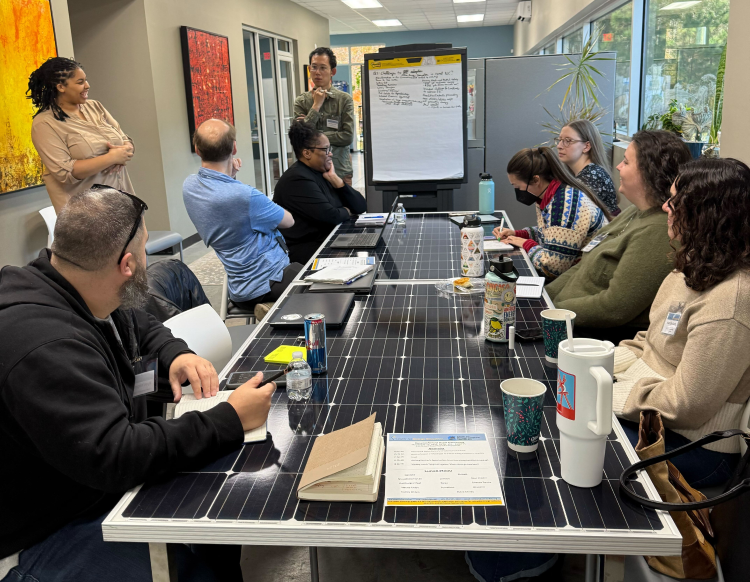Showing 18 results

Policy Analyst
Sophie Loeb is a Policy Analyst with the Center for Progressive Reform. Sophie sees racial injustice as the preeminent determinant of and gravest threat to public health. She is propelled to work at the mezzo and macro levels to advocate for environmental justice-affected communities, specifically in the climate change mitigation space.

Sophie Loeb | January 28, 2026
Two policy briefs published by the Center in recent months explain that even before the second Trump administration and the 119th Congress launched their broadsides against the Inflation Reduction Act (IRA), the scale and pacing of decarbonization was already lagging at investor-owned utilities. Most customers in the U.S. are served by investor-owned utilities. Due to their complicated mix of historical industry capture and political power, information asymmetries in the regulatory context, the profit motive of energy production and distribution, and tax policy, IOUs are often disincentivized from advancing an equitable clean energy transition. Our policy briefs explore several alternatives to the IOU model as part of a just transition to clean energy.

Sophie Loeb | December 2, 2025
On November 13, 20 folks attended the second annual rural clean energy convening in Roanoke Rapids, North Carolina, co-sponsored by the Center for Progressive Reform and the Center for Energy Education. Attendees included academics, energy policy advocates, small-scale developers, technical experts, and government representatives. We built off last year’s convening, addressing the new North Carolina policy landscape and context given the repeal of federal funding, the state’s proposed unfavorable carbon plan, and rising energy burden in communities.

Sophie Loeb | June 11, 2025
North Carolinians are facing more threats to our clean energy future at both the state and federal levels.

Sophie Loeb | April 23, 2025
As North Carolinians continue to grapple with rolling blackouts, rising energy bills, and recovery from a once-in-a-generation hurricane event, another pending environmental catastrophe is developing in our backyards. On Monday, May 5, the North Carolina Utilities Commission will hold a public hearing to gather feedback on Duke Energy’s plans to build a second new methane gas power plant near its existing coal plant on Hyco Lake in Person County as part of the state’s decarbonization plan.

Sophie Loeb | April 15, 2025
In the midst of countless federal deregulatory actions, it’s easy to lose track of what’s happening to undermine states’ climate regulations and laws. Here in North Carolina, we are facing the cascading consequences of federal deregulation layered on top of threats to our state’s carbon plan law.

Brian Gumm, Bryan Dunning, Catalina Gonzalez, Federico Holm, James Goodwin, Minor Sinclair, Rachel Mayo, Sophie Loeb, Spencer Green, Tara Quinonez | January 30, 2025
We at the Center for Progressive Reform cannot sit idly by and watch the Trump administration’s relentless attacks on the transgender community here in the United States and around the world. The Center’s staff condemns the Trump administration’s attacks on the transgender community — especially trans children.

Sophie Loeb | January 28, 2025
On December 11, 2024, in Roanoke Rapids, North Carolina, 40 folks attended the first annual rural clean energy convening co-sponsored by the Center for Progressive Reform and the Center for Energy Education. Attendees included FEMA representatives, USDA and other government agency officials, local residents, county commissioners, and energy policy advocates. The main topic of the […]

Sophie Loeb | November 7, 2024
On November 1, the North Carolina Utilities Commission issued its carbon plan order, two months in advance of the filing deadline. The order reflects an earlier settlement agreement among the Public Staff, Duke Energy, and Walmart that allows Duke Energy to build four new methane gas units while marginally increasing the amount of solar, battery storage, and wind resources in its proposed carbon reduction plan. Critically, the selected plan (known as Portfolio 3) fails to meet the 2030 interim carbon reduction timeline in House Bill 951 — the state’s carbon reduction law — and likely delays compliance to 2035.

Sophie Loeb | September 17, 2024
On September 17, the Center for Progressive Reform published a new policy brief, Rising to the Challenge: How State Public Utilities Commissions Can Use the Inflation Reduction Act to Advance Clean Energy. This brief examines the ability of public utilities commissions (PUCs) to incorporate Inflation Reduction Act (IRA) funding into their energy planning processes in order to expand the uptake of renewable energy resources at a lower cost to consumers.